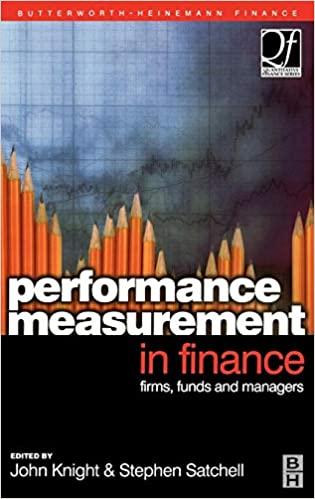Question
CAN SOMEONE LET ME KNOW IF I DID THESE RIGHT?? PLEASE 1. What is the effective rate of interest for an investment paying 18% compounded
CAN SOMEONE LET ME KNOW IF I DID THESE RIGHT?? PLEASE
1. What is the effective rate of interest for an investment paying 18% compounded monthly?
Effective rate of interest= (1+r)^n-1
r= 18% or .18; compounded monthly= 0.18/12
N= no of period ie 12
Effective rate r= (1+.18/12)^12-1
= 0.1956 ie 19.56%
2. If you want to buy a $25,000 car in 5 years, what single amount must you invest now at 10% compounded quarterly to have the money to pay cash?
Fv= PV(1+i)^n
Fv= 25,000 n=5 years so 5*4= 20 periods; r = 10% compounded quarterly ie .10/4
25,000=PV(1+.10/4)^20
25,000= PV (4.10/4)^20
PV= (25,000/1.025)^20
PV=$15,256.77
3. What is the present value of $50,000, 4 years from now at 12% interest compounded monthly?
Fv= Pv (1+r)^n
Fv=50,000; Pv?; n= 4 years compounded monthly ie 48; R= 12% compounded monthly ie .12/12
50,000= PV (1+.12/12)^48
PV=50,000/(1.01)^48
PV=$31,013.02
4. What is the future value of $5,000 in 15 years if you can earn 12% interest compounded semi-annually?
Fv=PV(1+i)^n
Fv=5,000; n=15 years semi annually= 30 periods; I=12% compounded semi annually=.12/2
5,000= PV (1+.12/2)^30
PV=5,000(1.06)^30
PV=$28,717.46
5. What is the future value of $800 deposited annually at 9% interest for 25 years if the deposits are made at the end of the period? And, if the deposits are made at the beginning of the period?
FV(end)= PMT[(1+i)^n-1)/i] (Ordinary annuity)
FV= $800; i=9% or .09; n=25 years
Fv+800[(1+0.09)^25-1)/0.09
FV=$67,760.72
FV=(beginning)= PMT[((1+i)^n-1)/i](1+r)
FV=$800; I=9% or 0.09; n=25 years
FV=800[(1+0.09)^25-1)/0.09)(1+0.09)
FV=$73,859.18
6. Using the information from the previous problem, how much more interest is earned from the annuity due than from the ordinary annuity?
Annuity due= annuity (beginning) - ordinary annuity
=$73,859.18-$67,760.72= $6,098.46
7. How much must be deposited now in order to withdraw $15,000 at the end of each year for 30 years, if interest is 11% compounded annually?
Annuity the end of each year= 15,000
N=30 years; r= 11% compounded annually
To find PV of an annuity of $15,000 @ the end of each of the year
PV= PMT [1-(I+i)^-n/i
PV=15,000[1-(I+0.11)^-30/0.11]
PV= PMT[1-(I+i)^-n/i
=$130,406.89
8. If you want $2,000,000 in your retirement fund in 45 years, and you can earn 14% compounded annually, what will be your annual contribution? How much interest will you earn?
FV= 2,000,000; N= 45 years; i= 14% compounded annually
We have the FV of an annuity to find the annuity
FV= PMT [(I+i)^n-1)/i]
2,000,000=PMT [((1+0.14)^45-1)/(0.14]
2,000,000= PMT [2590.5648]
PMT=$772.03
9. If you retire with $1,375,000 in your retirement fund and plan to live for 20 years, how much can you withdraw every year if your investment earns 10%?
PV= 1,375,000 n=20 years i=10%
To find annuity given the PV
PV=PMT [1-(1+i)^-n/I]
1,375,000= PMT [1-(1+0.10)^-20/0.10)
PMT(yearly withdrawl) =$161,506.98
10. How much more interest is earned from ordinary annuity payments of $6,000 per year for 25 years if you can increase your rate of interest from 6% to 9%?
PMT=$6,000 per year; n=25 years; i=6% to 9%
Interest at 6%
FV= PMT [((1+r)^25-1)/0.06]
FV= 6,000[((1+0.06)^25-1)/0.06]
=$329,187.07
Interest at 9%
FV=6,000[(91+0.09)25-1)/0.09]
= $508,205.38
More earned interest 9%- 6% = $508,209.38 - $329,187.07 = $179,018.31
Step by Step Solution
There are 3 Steps involved in it
Step: 1

Get Instant Access to Expert-Tailored Solutions
See step-by-step solutions with expert insights and AI powered tools for academic success
Step: 2

Step: 3

Ace Your Homework with AI
Get the answers you need in no time with our AI-driven, step-by-step assistance
Get Started


